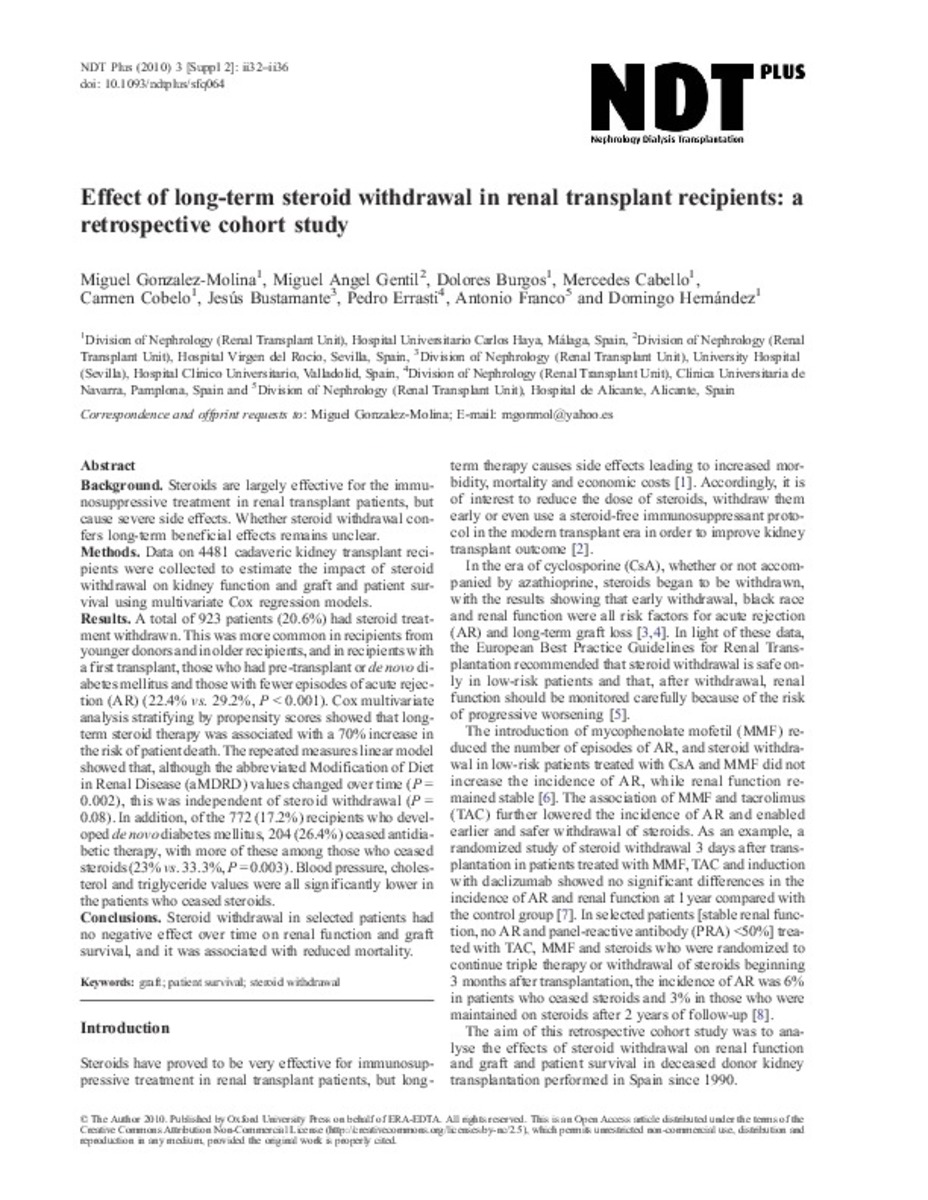Full metadata record
| DC Field | Value | Language |
|---|---|---|
| dc.creator | Gonzalez-Molina, M. (Miguel) | - |
| dc.creator | Gentil, M.A. (Miguel Angel) | - |
| dc.creator | Burgos, D. (Dolores) | - |
| dc.creator | Cabello, M. (Mercedes) | - |
| dc.creator | Cobelo, C. (Carmen) | - |
| dc.creator | Bustamante, J. (Jesús) | - |
| dc.creator | Errasti, P. (Pedro) | - |
| dc.creator | Franco, A. (Antonio) | - |
| dc.creator | Hernández, D. (Domingo) | - |
| dc.date.accessioned | 2014-08-12T12:40:37Z | - |
| dc.date.available | 2014-08-12T12:40:37Z | - |
| dc.date.issued | 2010-06 | - |
| dc.identifier.citation | González-Molina M, Gentil MA, Burgos D, Cabello M, Cobelo C, Bustamante J, et al. Effect of long-term steroid withdrawal in renal transplant recipients: a retrospective cohort study. NDT Plus. 2010 Jun;3(Suppl_2):ii32-ii36 | es_ES |
| dc.identifier.issn | 1753-0784 | - |
| dc.identifier.uri | https://hdl.handle.net/10171/36320 | - |
| dc.description.abstract | BACKGROUND. Steroids are largely effective for the immunosuppressive treatment in renal transplant patients, but cause severe side effects. Whether steroid withdrawal confers long-term beneficial effects remains unclear.METHODS. Data on 4481 cadaveric kidney transplant recipients were collected to estimate the impact of steroid withdrawal on kidney function and graft and patient survival using multivariate Cox regression models.RESULTS. A total of 923 patients (20.6%) had steroid treatment withdrawn. This was more common in recipients from younger donors and in older recipients, and in recipients with a first transplant, those who had pre-transplant or de novo diabetes mellitus and those with fewer episodes of acute rejection (AR) (22.4% vs. 29.2%, P < 0.001). Cox multivariate analysis stratifying by propensity scores showed that long-term steroid therapy was associated with a 70% increase in the risk of patient death. The repeated measures linear model showed that, although the abbreviated Modification of Diet in Renal Disease (aMDRD) values changed over time (P = 0.002), this was independent of steroid withdrawal (P = 0.08). In addition, of the 772 (17.2%) recipients who developed de novo diabetes mellitus, 204 (26.4%) ceased antidiabetic therapy, with more of these among those who ceased steroids (23% vs. 33.3%, P = 0.003). Blood pressure, cholesterol and triglyceride values were all significantly lower in the patients who ceased steroids.CONCLUSIONS. Steroid withdrawal in selected patients had no negative effect over time on renal function and graft survival, and it was associated with reduced mortality. | es_ES |
| dc.language.iso | eng | es_ES |
| dc.publisher | Oxford University Press (OUP) | es_ES |
| dc.rights | info:eu-repo/semantics/openAccess | es_ES |
| dc.subject | Retrospective cohort study | es_ES |
| dc.subject | Steroid withdrawal | es_ES |
| dc.subject | Renal transplant | es_ES |
| dc.subject | Long-term | es_ES |
| dc.subject | Humans | es_ES |
| dc.subject | Graft | es_ES |
| dc.subject | Patient survival | es_ES |
| dc.title | Effect of long-term steroid withdrawal in renal transplant recipients: a retrospective cohort study | es_ES |
| dc.type | info:eu-repo/semantics/article | es_ES |
| dc.identifier.doi | http://dx.doi.org/10.1093/ndtplus/sfq064 | es_ES |
Files in This Item:
Statistics and impact
Items in Dadun are protected by copyright, with all rights reserved, unless otherwise indicated.






